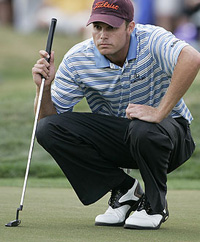Putting: Don't think, just do it!
Scientific tips on how to free your mind

WHEN YOU'RE standing over a putt, how much do you think about your technique? You know the kind of thing...hands in the right place, gripping lightly, shoulders square to the target, ball position correct, sole flat to the putting surface, eyes over the ball... Need I say more? And that's after you've already considered the line on which you need to start the ball, the slope in the green, the weight of the strike, the feel off the sweet spot on the clubface. Is it any wonder putting can appear the easiest and yet the most difficult in golf to master? But help is at hand, a new survey reveals that we think too much about putting, instead of just DOING IT! The researchers at the University of St Andrews claim that thinking too much about your putting technique, even between shots, can make you play worse, not better. The scientists who have studied dozens of golfers say it can undo natural talent and disrupt future performance. | |
Psychologist Professor Michael Anderson, in collaboration with Kristin Flegal at the University of Michigan, set out to test the view that 'overthinking' during performance can have negative results and found that it undermined the bility of skilled golfers after they had consciously reflected upon their putting. Researchers asked 80 low handicap and novice golfers to practice a particular putting skill until they holed three successive - and then demanded they spend five minutes describing in detail what they did. They found that golfers ability to perform was seriously impaired when they tried the same putt again and took twice as many attempts to sink the same-length putt, compared to golfers who spent the same five minutes doing something completely different. Professor Anderson said, "This effect was especially dramatic in skilled golfers who were reduced to the level of novices after just five minutes of describing their technique. High handicappers, by contrast, were largely unaffected, and perhaps even helped a little, by verbally describing their movements. "It's a fairly common wisdom in sport that `thinking too much' hurts performance; it can be an obvious distraction and describing how you holed a putt can be incredibly disruptive. In skilled golfers, we found that describing their skill simply impaired its retention." The researchers say the effect is called verbal overshadowing, which encourages the brain to focus more on language rather than on brain systems that support skills. Professor Anderson, a cognitive neuroscientist, with an interest in memory and attention in humans, believes that overthinking does not affect novice golfers since they probably haven't developed enough skills to forget in the first place. "In a nutshell, our study suggests that whatever you do, don't think too hard about your technique in between holes. Simply talking about a recent action may sow the seeds of poor execution later." | |
He also agrees that the scientists discoveries may account for the observation often aimed at coaches in many sports, who never quite made it as top professionals - those who can't...teach. Nick Watney, the young American who won the Bucik Invitational at the weekend is a great believer in not over-analysing the mechanics of his putting stroke. "Golfers become too absorbed in what the putter is doing during the backswing, impact and follow-through. It makes us believe that 'if I take it back just like this, impact it just like this and follow-through just like this,' then the end result will be a made putt, " he says . "But this pulls the mind away from the target and doesn't allow us to use our instincts. You can become very mechanical and start trying to steer putts into the hole." He claims great putters do just the opposite, as the St Andrews scientists discovered. The stroke is not calculated, it's free and uninterrupted and you could argue that good putters don't really sense what the putter head is doing during the backswing, impact or follow-through. They are more focused on the target. He says: "Don't worry about the putter head path. Instead, focus on the overall tempo. Count in your mind "one, two". Make "one" the backswing and "two" the forward swing. Keep the tempo consistent so the putter is moving the same pace back and through. The length of stroke will match up on both sides and allow for even acceleration as the putts get longer. "Look at the hole. Practice from five feet and focus your eyes on the hole during the stroke. This drill frees your mind from the putter head to focus on the target and putting the ball into the hole rather than what the putter head is doing. You may find out just how good of a putter you can be, if you just allow it to happen."
|














